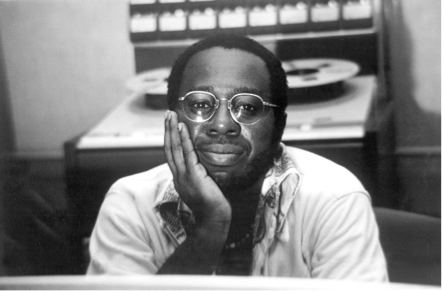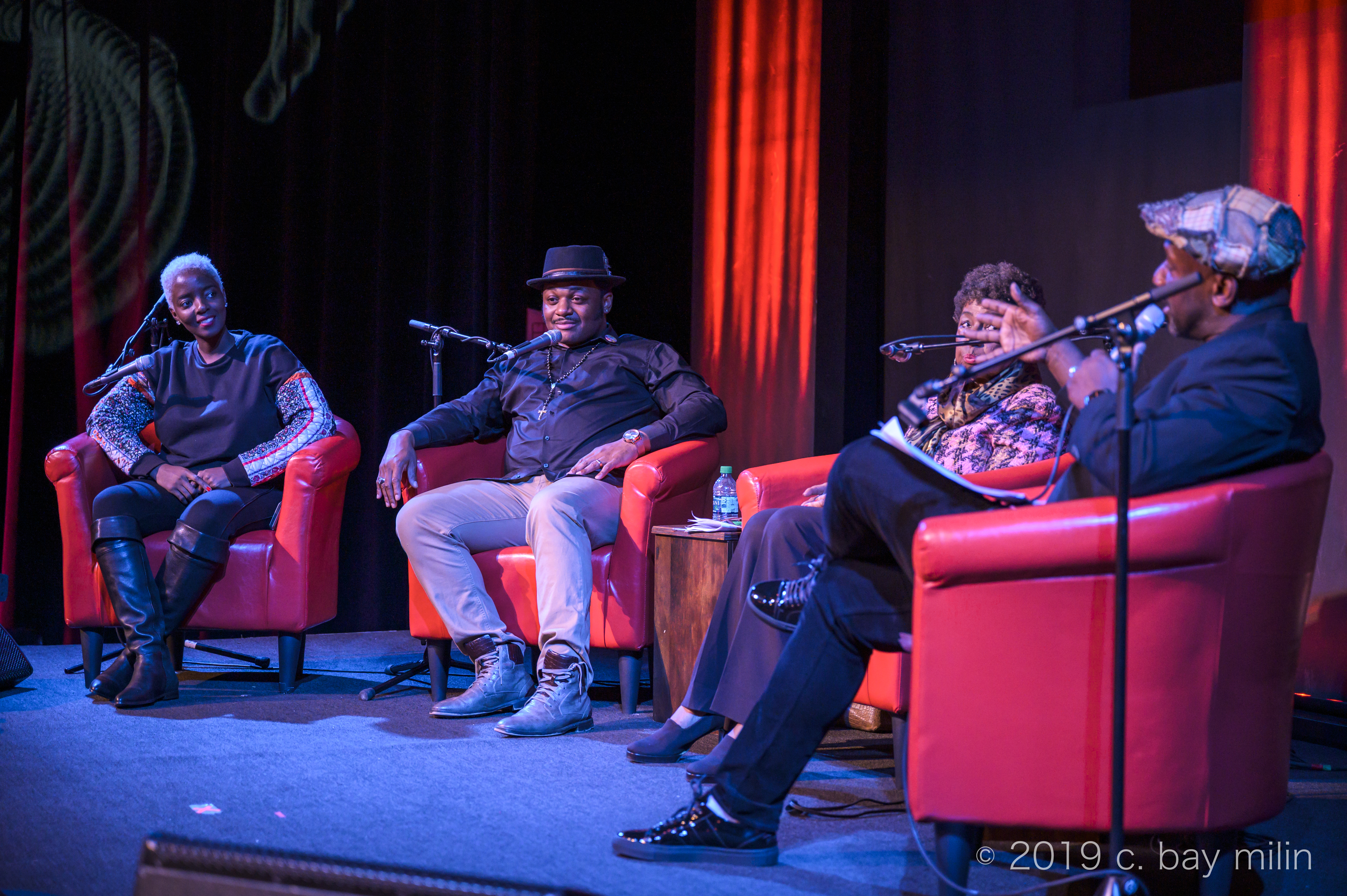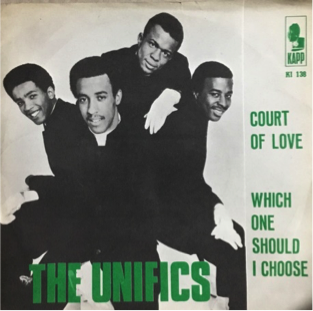Twisted Melodies:
A Donny Hathaway Story
Thu. May 30 - Sun. Jun 2, 2019
Twisted Melodies Digital Stage Sponsored By

Written and performed by Kelvin Roston, Jr., Twisted Melodies imagines the last night of Donny Hathaway’s life, January 13, 1979. Alone with Hathaway in a hotel room in New York City after a recording session, we journey back in time to learn about his past, appreciate his musical genius, and learn about his struggle with schizophrenia.
Twisted Melodies was initially called “Psychology of a Genius,” and was created by Kelvin Roston, Jr. as a one-man, 30-minute show at The Black Rep in St. Louis. Now an evening-length theatrical presentation, Twisted Melodies will have its run at the Apollo Theater May 30 - June 2, 2019.
Learn More

Donny Hathaway (1934 - 1979)
Though only 33 when he died, Donny Hathaway’s flowing creativity remained in the hearts and minds of people who fell in love with his sound during the late 1960s and through much of the 1970s.
Mrs. Martha Pitts
Drusella Huntley was Donny Hathaway’s mother, but his grandmother, Mrs. Martha Pitts, reared him. In her house, there was only room for music of praise. Nothing secular was to be played. She was an evangelist and a musician, who was known on the Gospel circuit as a singer. Hathaway, then known as Donny Pitts, was raised in Trinity Baptist, in St. Louis, Missouri. When he was three, Mrs. Pitts began teaching him how to play the piano. During services, he sang and played, refining his natural talents in the Black church, keeping with its tradition of exceptional musicality that immediately communicates deep emotion.
A Full Ride
Howard University’s music school, in the early 1960s, generally focused on European classical music, so it’s clear that the soon-to-be, standard-setting, soulful, R & B performer was comfortable in another musical realm. Hathaway’s accomplishments and gifts gained him a full ride to the prestigious university. He intended to complete his degree there, but fate had other plans: He was on stardom’s path, and Howard was where he met many show business collaborators, particularly his musical soulmate, Roberta Flack. He also met his future wife, Eulaulah, a classically trained vocalist.

The Black and Gold: Alpha Phi Alpha ΑΦΑ
There is a long list of accomplished Black men who were and are members of Alpha Phi Alpha, the oldest intercollegiate Greek-letter organization for African American men in the United States. Hathaway was one of them. Others who wore the black and gold are Adam Clayton Powell, Jr., Paul Robeson, Martin Luther King, Jr., and Supreme Court Justice Thurgood Marshall. Still living the Alpha vow of excellence are New York City Mayor David N. Dinkins, recording artist Gerald Albright, and actor Omari Hardwick.
Learn More
Stepping Into the Secular: Gigging in D.C. with the Ric Powell Trio
While he was studying at Howard, Hathaway became a member of drummer Ric Powell’s jazz trio. This was a big deal for Hathaway because his religious upbringing instilled in him that secular music was the devil’s music. Many members of holiness churches believed that any properly raised, God-fearing Gospel musician, who went into the Pop realm would wind up like Sam Cooke, who was murdered in the early 1960s under mysterious circumstances.
During an audition of the trio at Billy’s, a popular D.C. nightspot, the club owner told Powell that his band needed a singer. Hathaway only knew three secular songs. One of them was Ray Charles’s “Georgia on My Mind.” The Ric Powell Trio was booked immediately and went on to make a name for itself in Black and white clubs, both Uptown and Downtown.
Around this time, Curtis Mayfield visited D.C., experienced the Hathaway magic and everything he could do, and invited him to come to Chicago to work at Curtom Records.
“When I think of music, I think of music in totality.” - Donny Hathaway, 1973 recorded interview
A Musician’s Musician: An Arranger Extraordinaire
Roberta Flack said that Hathaway had “a lot of Bach in him,” and Hathaway called himself a “country music freak.” Ric Powell said, “Donny was like Duke Ellington. The orchestra was his instrument.” Quincy Jones said, “When you spend your life trying to be a musician, you know a real one when you hear it …and Donny Hathaway was a real musician.” He worked with everyone from Unifics to Willie Nelson to the Staple Singers to Aretha Franklin, and inspired the likes of George Benson, who recorded Hathaway’s instrumental “Valdez in the Country” on his 1977 album “In Flight”. Hathaway’s virtuoso piano playing, composition, orchestration, and arranging allowed him to create masterpieces across genre. His special touch seemed to ensure that hits and other outstanding songs were created. He worked for Curtom Records, Chess, and Stax before breaking out on his own.
Learn More


Gone Away
For a short stint, Hathaway was the musical director for the Impressions. “Gone Away,” a song he penned with his Howard roommate, Leroy Hutson, and Curtis Mayfield was recorded by a few artists including The Impressions. Roberta Flack included it on her King Curtis produced album Chapter Two. Lovelace Watkins and Queen Latifah also recorded versions of the song.

Willie Nelson
A multifaceted musician with an appreciation for numerous genres, Hathaway arranged the strings for Willie Nelson’s song, Shotgun Willie.
Talkin' 'Bout the Ghetto
Following the assassination of Martin Luther King, Jr., the uprising in Washington, D.C. inspired Hathaway and his Howard U. roommate, Leroy Hutson, to pen “The Ghetto.” It was Hathaway’s breakthrough song. The piece captured the energy of “place,” and is a classic.
Messages in the Music
Donny Hathaway was one among a number of musicians who called attention to racial, economic, social and political strife in the 1970s

Curtis Mayfield, Curtis, 1970

Marvin Gaye, What's Going On, 1971

Stevie Wonder, Music of my Mind, 1972

Donny Hathaway, Extension of a Man, 1973
Winners Have Yet to be Announced
Ed Pavlić’s 2008 book of poems explore the complexities of Hathaway’s life


This Christmas
Hathaway and Nadine McKinnor wrote this seasonal song that has become a standard part of many performers’ holiday offerings.
Writer, scholar and cultural critic Emily J. Lordi, has written extensively about Hathaway music and life, including his 1972 recorded concert album Donny Hathaway Live, the song This Christmas and Hathaway’s marriage and musical collaboration with his wife Eulalah.
I Hear Voices, I See People
The title of Hathaway’s first studio album was “Everything is Everything,” an early-1970s expression for “everything is fine.” But in Hathaway’s case, it wasn’t. He was carrying the burden of a severe mental illness—paranoid schizophrenia—for which treatment was (and still is) difficult. The album’s lead song, “Voices Inside (Everything is Everything),” was co-written by Hathaway, Powell, and Phil Upchurch. The lyrics seem to describe Hathaway’s “internal life,” contending with hallucinations. How hard it seems for someone so afflicted to function from day to day. For Hathaway, it eventually became impossible.

Influence x Influenced
Hathaway’s contributions to music remain a major influence on many contemporary artists across music genres. His work has been sampled or covered by artists from Jay-Z and Chance the Rapper, to Queen Latifah, Alicia Keys, and many others.
Learn More
Hollywood Comes Calling
Hathaway wrote and performed the theme song for the sitcom “Maude.” The clever lyrics pay homage to iconic heroines over the centuries.
When Quincy Jones realized he was too overextended to score the film Come Back Charleston Blue, he told the producers that Donny Hathaway was the man for the job. The movie was based on a Chester Himes’s novel The Heat’s On, featuring the characters Coffin Ed and Gravedigger Jones—two African American detectives in Harlem.

Donny Hathaway
“Little Ghetto Boy”
Laylah Hathaway
“Little Ghetto Boy”
He Just Disappeared
It don't sound right
This little room
My melodies
Too prominent
Substantial
They need space
Riffs can't fly in concealed spaces
They've got to breathe
I've got to breathe
-Twisted Melodies

Undoubtedly, Hathaway’s struggle with schizophrenia impacted his ability to live life as a public musician. For many years, during the 1970s, his fans wondered where he has … what happened?
schiz·o·phre·ni·a
/ˌskitsəˈfrēnēə,ˌskitsəˈfrenēə/
noun
Schizophrenia is a chronic and severe mental disorder that affects how a person thinks, feels, and behaves….
Roberta Flack and Donny Hathaway: The Duets

A Perfect Musical Partnership
Both Flack and Hathaway were child prodigies. Both attended Howard University to major in music. Both were both raised in the church. Their album, simply titled Roberta Flack and Donny Hathaway, includes a Gospel-style, “Come Ye Disconsolate,” another beautiful example of their moving musical camaraderie. “Be Real Black for Me” affirms racial love and its connection to an ideal romantic love.
And the Winner Is!...
It’s hard to believe Donny Hathaway and Roberta Flack recorded “Where Is the Love” in 15 minutes. The tune was the hit single from the critically acclaimed album they recorded in 1972. On March 3rd of the next year, Hathaway and Flack won a Grammy Award for Best Pop Performance by a Duo or Group with Vocals.
The Closer I Get To You
In 1977, Roberta Flack featured Hathaway on her album, Blue Lights in the Basement, and there was talk of more duets in the future. The song “The Closer I Get To You” was written by Reggie Lucas and James MTume.

Reemergence
The wish of Flack and Hathaway lovers came true in 1979 with the release of the album Back Together Again which featured the songs “You Are My Heaven” and “Back Together Again.” It would be Hathaway’s last recording.
Legacy
Laylah and Kenya Hathaway
Laylah and Kenya Hathaway carry the Hathaway name well, singing from the heart of their heritage as Donny and Eulaulah’s daughters.
Donnita Hathaway
In 2015, on what would have been Hathaway’s 70th birthday, the youngest of Hathaway’s daughters, Donnita, launched the Donny Hathaway Legacy Project. The DHLP honors the musical contributions of Donny Hathaway and seeks to educate the public about mental health.
“Things are moving fast... Hold on tight and you will last.” - Someday We’ll All Be Free
Someday We'll All Be Free, smooth jazz recording artist
Though lyricist Edward Howard intended for “Someday We’ll All Be Free” to soothe Hathaway’s inner struggles to “hang on to the world,” the song connects Hathaway to the broader political struggles of Black America. The refrain, “Take it from me, someday we’ll all be free,” is the driving sentiment of resilient people.
Face2Face: A Generation Breaks the Silence
May 2019 - Record Union publishes “The 73 Percent Report,” the result of a global survey on mental health and wellbeing among independent music makers.
Notorious B.I.G.
"Suicidal Thoughts"
Mac Miller
"Self-Care"
Breaking Through the Stigma of Mental Health
Boris Lawrence Henson Foundation
In 2018 actress Taraji P. Henson created the Boris Lawrence Henson Foundation in honor of her father, a Vietnam veteran who suffered from mental illness. In a People Magazine article, Henson discussed her own challenges with depression and anxiety.
Read Article
Jessica "Dr. Jess" Clemons
Dr. Jessica Clemons is a Psychiatrist whose mission is to reduce the stigma associated with mental illness, particularly in the Black community.
Read Article
National Alliance for Mental Illness (NAMI)
The National Alliance on Mental Illness, (NAMI), is the nation’s largest grassroots mental health organization dedicated to building better lives for the millions of Americans affected by mental illness.
Learn More
Live Wire: Everything is Everything
Donny Hathaway gifted us with a catalog of music that is as vital today as when the songs were first recorded. Ahead of the Apollo premiere of Twisted Melodies, songwriter and musician Gordon Chambers led an exploration into Hathaway’s music and timeless influence with panelists included Barbara J. Harris, Kelvin Roston, Jr., and Donnita Hathaway.
View Livestream


